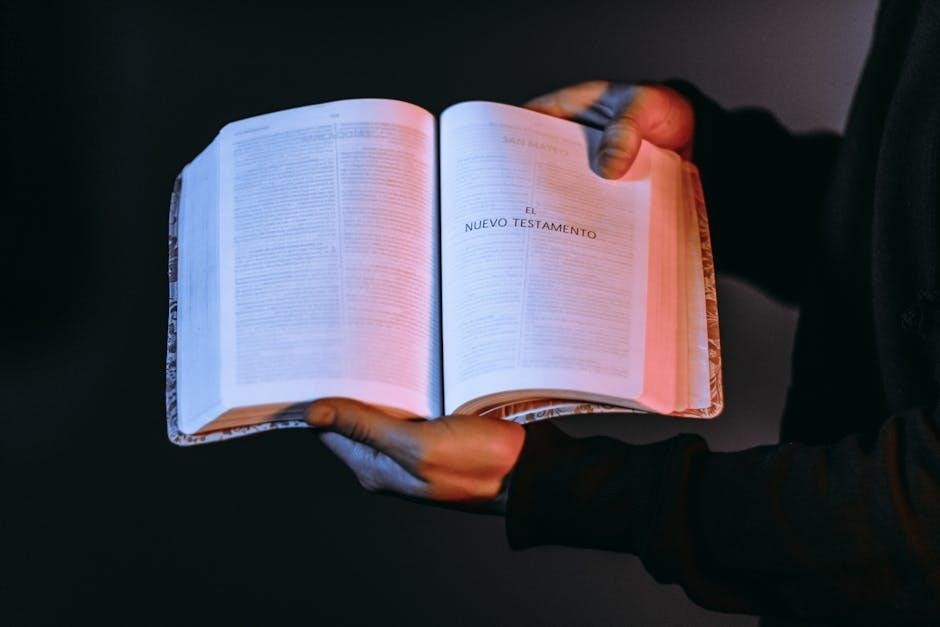This satirical document blends humor and critique‚ imagining Donald Trump in a biblical context. It explores themes of power‚ morality‚ and faith‚ sparking debates about religion and politics in contemporary society.
Background and Context
The concept of “The Gospel of Donald PDF” emerges from the intersection of satire‚ religion‚ and politics‚ particularly in the context of Donald Trump’s influence on contemporary culture. This document‚ often referenced in satirical literature‚ blends biblical narratives with modern political themes‚ creating a unique and controversial discourse. It draws inspiration from works like The Lost Gospel of Donald by Preston Coleman and The Trump Bible: The Gospel of Donald Trump by Peregrin Wood‚ which reimagine biblical stories with Donald Trump as a central figure. These texts use humor and irony to critique Trump’s behavior and policies‚ often juxtaposing his actions with Christian teachings. The document gained traction amid debates about the prosperity gospel and its alignment with political nationalism‚ particularly within evangelical communities. By exploring these themes‚ “The Gospel of Donald PDF” reflects broader cultural trends‚ where religion and politics are increasingly intertwined‚ sparking both fascination and criticism. Its satirical approach challenges readers to reflect on the ethical and theological implications of blending faith with political ideology.
Overview of the Document’s Content

“The Gospel of Donald PDF” presents a satirical exploration of Donald Trump’s persona through a biblical lens‚ blending humor with critique. The document reimagines key biblical narratives‚ placing Trump in scenarios that mirror those of Jesus Christ‚ such as encountering disciples‚ performing miracles‚ and delivering teachings. It critiques Trump’s behavior by contrasting his actions with Christian values like humility‚ forgiveness‚ and love. The content also delves into political themes‚ satirizing Trump’s policies and rhetoric‚ particularly his blend of nationalism and religious symbolism. The document’s structure mimics traditional gospels‚ with chapters detailing Trump’s “ministry‚” interactions with followers‚ and confrontations with adversaries. By using this format‚ it highlights the collision of religious and political ideologies‚ offering a provocative commentary on modern leadership and faith. The tone remains irreverent‚ aiming to provoke reflection on the ethical implications of conflating political power with religious authority. Overall‚ the document serves as a bold‚ satirical critique of Trump’s influence and legacy.
Relevance in Contemporary Discussions
“The Gospel of Donald PDF” is a timely and provocative document that intersects with ongoing debates about religion‚ politics‚ and culture. Its satirical take on Donald Trump’s persona and policies resonates in an era where political and religious identities are deeply intertwined. The document critiques the blending of nationalism and faith‚ a theme that has gained prominence in discussions about Trump’s influence on evangelical communities. By imagining Trump in a biblical context‚ it challenges readers to reflect on the ethical implications of conflating political power with religious authority. The document also taps into broader conversations about the prosperity gospel‚ which has been linked to Trump’s appeal among certain religious groups. Its irreverent approach sparks debates about satire’s role in critiquing leadership and the risks of profaning sacred texts for political gain. As a cultural artifact‚ it reflects and amplifies the polarized discourse surrounding Trump’s legacy‚ making it a relevant topic in contemporary discussions about religion‚ ethics‚ and politics.

Main Themes and Interpretations
The document explores satire‚ political ambition‚ and faith‚ contrasting Trump’s behavior with Christian values‚ sparking debates on morality‚ leadership‚ and religion’s role in politics‚ challenging perceptions of power and spirituality.

The Satirical Approach in “The Lost Gospel of Donald”
Preston Coleman’s The Lost Gospel of Donald employs a satirical approach to explore the hypothetical meeting of Donald Trump and Jesus Christ. The book reimagines biblical scenarios with Trump as a central figure‚ blending humor and critique. By placing Trump in a religious context‚ the narrative challenges readers to reflect on themes of morality‚ power‚ and spirituality. The text uses irony and exaggeration to highlight the contrast between Trump’s behavior and traditional Christian values‚ such as humility and forgiveness. For instance‚ it portrays Trump engaging in miracles and parables that reflect his real-world persona‚ creating a stark juxtaposition with Jesus’ teachings. The satire also critiques modern political and religious culture‚ particularly the intersection of nationalism and faith. Through its irreverent tone‚ the book aims to provoke thought on the ethical implications of conflating political ambition with religious ideals. Ultimately‚ The Lost Gospel of Donald serves as a humorous yet sharp commentary on contemporary society‚ appealing to both critics and supporters of Trump alike.
Political and Religious Blending in “The Trump Bible”
The Trump Bible: The Gospel of Donald Trump by Peregrin Wood offers a unique blend of political satire and religious parody. The book reimagines Trump as a prophetic figure‚ merging his political rhetoric with biblical narratives. By presenting Trump’s statements and actions in a sacred context‚ the text critiques the fusion of nationalism and religious devotion. The narrative often portrays Trump as a messianic leader‚ emphasizing themes of power‚ loyalty‚ and divine mandate. This blending of political and religious elements highlights the ways in which some political figures are elevated to near-sacred status. The book also examines how certain evangelical communities have embraced Trump‚ aligning his policies with their religious beliefs. Through this satirical lens‚ Wood challenges readers to consider the ethical implications of conflating political authority with divine will. By juxtaposing Trump’s controversial behavior with traditional Christian values‚ the book sparks reflection on the role of religion in modern politics. Ultimately‚ The Trump Bible serves as a provocative commentary on the intersection of faith and political leadership.
Critiques of Donald Trump’s Behavior in a Christian Context
Donald Trump’s behavior has been widely scrutinized in the context of Christian teachings‚ with many critics arguing that his actions contradict core biblical values. Evangelical leaders like Russell Moore have openly criticized Trump‚ emphasizing that his rhetoric and conduct often stand in opposition to the principles of humility‚ forgiveness‚ and love taught by Jesus. The prosperity gospel‚ which aligns wealth and success with divine favor‚ has been linked to Trump’s rhetoric‚ with critics arguing that it distorts the message of Christianity. Additionally‚ Trump’s divisive language and policies have been challenged by religious figures who advocate for compassion and unity. The blending of nationalism with religious ideals has also raised ethical concerns‚ as some view it as a misuse of faith for political gain. These critiques highlight the tension between Trump’s public persona and the moral expectations tied to Christian leadership. The debate underscores the broader challenge of reconciling political power with religious ethics in contemporary society.

Key Works and Authors
Preston Coleman’s The Lost Gospel of Donald humorously imagines Trump meeting Jesus. Peregrin Wood’s The Trump Bible satirically blends politics and faith. Donald Senior’s commentaries offer scholarly insights into biblical texts‚ contrasting with the satirical works.
Preston Coleman’s “The Lost Gospel of Donald”
Preston Coleman’s The Lost Gospel of Donald presents a satirical exploration of Donald Trump’s character through a biblical lens. The book imagines a scenario where Trump meets Jesus Christ‚ blending humor with moral commentary. It reimagines key biblical events‚ casting Trump in a modern-day parable that critiques his behavior and ideology. Coleman’s work is both irreverent and thought-provoking‚ challenging readers to reflect on themes of power‚ greed‚ and redemption. The narrative follows a familiar cast of characters from the Holy Land circa 30 CE‚ with Trump’s personality and actions juxtaposed against the teachings of Jesus. This creative approach sparks discussions about morality‚ forgiveness‚ and the clash between worldly ambition and spiritual values. The book has been well-received for its unique blend of satire and social critique‚ earning recognition as a Foreword INDIES finalist in Humor (Adult Fiction). Coleman’s writing style is engaging and provocative‚ making The Lost Gospel of Donald a compelling read for those interested in political satire and religious themes.
Peregrin Wood’s “The Trump Bible: The Gospel of Donald Trump”
Peregrin Wood’s The Trump Bible: The Gospel of Donald Trump offers a satirical take on Donald Trump’s influence‚ blending religious and political themes. The book critiques Trump’s persona by presenting his rhetoric and actions through a biblical lens. Wood’s narrative reimagines Trump as a central figure in a modern “gospel‚” highlighting his controversial policies and behavior. The text draws parallels between Trump’s worldview and religious ideologies‚ exploring themes of nationalism and power. Wood’s use of satire challenges readers to reflect on the intersection of politics and religion in contemporary America. The book has sparked both praise and controversy‚ with some hailing it as a bold critique of Trump’s legacy while others criticize its irreverent approach. By recontextualizing Trump’s story within a religious framework‚ Wood’s work invites readers to examine the ethical and theological implications of his influence. The Trump Bible remains a significant piece of political satire‚ contributing to ongoing debates about Trump’s impact on society.
Donald Senior’s Biblical Commentaries
Donald Senior‚ a renowned biblical scholar‚ has authored numerous commentaries on the Gospels‚ including the Gospel of Matthew and the Gospel of John. His work provides deep theological insights‚ helping readers understand the historical and cultural contexts of these texts. Senior’s commentaries are known for their clarity and accessibility‚ making complex biblical themes approachable for both scholars and lay readers. His analysis often emphasizes the relevance of biblical teachings in modern times. Notably‚ Senior’s commentary on the Gospel of John is part of the Learn25 collection‚ which includes a free PDF study guide. This resource is particularly useful for those engaging in structured biblical studies. Senior’s contributions to biblical scholarship have been widely praised for their thoroughness and depth. His work continues to be a valuable resource for anyone seeking to explore the richness of the Gospels.

Religious and Political Analysis

The document critiques Donald Trump’s behavior through a Christian lens‚ blending satire with theological themes. It challenges notions of morality‚ prosperity gospel ideals‚ and the intersection of nationalism with religious endorsements‚ sparking ethical debates.
The Prosperity Gospel and Its Influence
The prosperity gospel‚ a controversial theological belief‚ suggests that wealth and success are divine rewards for faith. In the context of “The Gospel of Donald PDF‚” this ideology is satirically linked to Donald Trump’s persona‚ who often embodies material success. The document critiques how Trump’s rhetoric aligns with prosperity gospel principles‚ emphasizing personal gain and power over humility and compassion. This critique reflects broader debates within evangelical communities‚ where some leaders‚ like Russell Moore‚ have denounced Trump’s actions as contradictory to Christian values. The prosperity gospel’s influence is also tied to political outcomes‚ as it resonates with certain voter demographics‚ particularly during Trump’s rise. By juxtaposing biblical teachings with Trump’s behavior‚ the document highlights ethical tensions between religious ideals and political realities‚ challenging readers to reflect on the intersection of faith and leadership.
Nationalism and Religion in Trump’s Endorsements

Donald Trump’s endorsements often intertwine nationalism with religious symbolism‚ a theme explored in “The Gospel of Donald PDF.” His promotion of the “God Bless the USA Bible” exemplifies this blend‚ where patriotic and religious narratives converge. Critics argue this approach misuses scripture to justify nationalist agendas‚ potentially undermining its spiritual purpose. Religious leaders have expressed concern over how Trump’s rhetoric aligns divine mandate with political ideologies‚ creating a polarizing effect. The document critiques this fusion‚ highlighting how it simplifies complex theological concepts into slogans that appeal to a specific base. By examining these endorsements‚ the text reveals how nationalism can reshape religious discourse‚ often at the expense of inclusivity and humility. This critique reflects broader debates about the role of religion in politics and the ethical implications of mixing faith with national identity.
Ethical and Theological Critiques
The “Gospel of Donald PDF” draws sharp criticism for its ethical and theological contradictions. Critics argue that it manipulates religious narratives to justify Donald Trump’s controversial actions and ideologies. Many religious leaders‚ including vocal opponents like Russell Moore‚ denounce Trump’s behavior as antithetical to Christian values. The document highlights how Trump’s self-serving actions‚ pride‚ and divisive rhetoric clash with teachings of humility‚ love‚ and forgiveness central to the Bible. Ethicists point out the absence of compassion and empathy in Trump’s public persona‚ which starkly contrasts with Jesus’ emphasis on caring for the marginalized. The PDF also critiques the prosperity gospel‚ a theology often linked to Trump’s base‚ for its focus on wealth and power over spiritual growth. This critique extends to the broader theological community‚ where scholars argue that such interpretations distort the essence of Christianity. The document serves as a catalyst for deeper reflection on how political figures appropriate religious language to legitimize morally questionable behaviors.

Cultural and Social Impact
The “Gospel of Donald PDF” sparked intense debate‚ blending satire and critique to challenge societal norms. Its controversial themes polarized audiences‚ fueling discussions on religion‚ politics‚ and culture‚ while reflecting broader tensions in contemporary society.
Public Reception and Controversies
The “Gospel of Donald PDF” has ignited significant controversy and debate across various audiences. Critics argue that the document blurs the lines between satire and blasphemy‚ with some viewing it as a disrespectful parody of religious texts. Supporters‚ however‚ praise its bold critique of modern politics and societal norms.
The satirical portrayal of Donald Trump in a biblical context has drawn both laughter and outrage. Many evangelical leaders have condemned the document‚ labeling it as an affront to Christian values. Conversely‚ progressive voices have embraced it as a scathing commentary on the intersection of religion and politics.
Public reception has been deeply polarized‚ reflecting broader cultural divides. Media coverage has amplified these tensions‚ with outlets like The Guardian highlighting its provocative nature. The document has also sparked discussions within academic circles‚ where scholars debate its literary and theological implications.
Ultimately‚ the “Gospel of Donald PDF” serves as a lightning rod for contemporary societal debates‚ challenging readers to confront their views on religion‚ politics‚ and satire.
Impact on Evangelical Communities
The “Gospel of Donald PDF” has had a profound and divisive impact on evangelical communities. Many evangelical leaders have openly criticized the document‚ arguing that it misrepresents Christian teachings and trivializes sacred texts. Prominent figures like Russell Moore have condemned its blend of satire and religious themes‚ asserting that it undermines the integrity of the Gospel message.
However‚ the document has also resonated with some evangelicals who view it as a critique of the prosperity gospel and the politicization of religion. Its portrayal of Donald Trump in a biblical context has sparked debates about the alignment of evangelical values with political ideologies. While some see it as a bold commentary on modern Christianity‚ others view it as sacrilegious and harmful.
The controversy has deepened existing divides within evangelical communities‚ with some embracing the document’s satirical critique of power and wealth‚ while others reject it as contradictory to their faith. This polarization highlights the complex interplay between religion‚ politics‚ and satire in contemporary society.
Media Coverage and Satirical Responses
The release of the “Gospel of Donald PDF” has garnered significant media attention‚ with outlets like The Guardian and The Presbyterian Outlook providing in-depth analyses. These publications have highlighted the document’s controversial blend of satire and religious themes‚ often critiquing its perceived blasphemy and political undertones. Media coverage has also explored the broader implications of using religious satire to critique political figures‚ sparking debates about free speech and the role of religion in public discourse.
In addition to news articles‚ satirical responses have flooded social media and online platforms. Many commentators have used humor and irony to further critique the document’s portrayal of Donald Trump in a biblical context. These responses often mock the idea of Trump as a religious figure‚ amplifying the document’s original satirical intent. However‚ not all reactions have been positive‚ with some critics accusing the document’s authors of crossing the line into sacrilege.
Overall‚ the media coverage and satirical responses to the “Gospel of Donald PDF” reflect the polarized nature of contemporary political and religious discourse‚ with the document serving as a lightning rod for both criticism and creative expression.

The “Gospel of Donald PDF” serves as a provocative intersection of satire‚ religion‚ and politics‚ reflecting contemporary societal tensions. Its controversial nature underscores the complex relationship between faith and leadership in modern discourse.
The “Gospel of Donald PDF” is a satirical document that imagines Donald Trump in a biblical context‚ blending humor with critique. It explores themes of power‚ morality‚ and faith‚ sparking debates about religion and politics. The document reflects contemporary societal tensions‚ particularly the intersection of nationalism and religious ideology. Through its provocative narrative‚ it critiques Trump’s behavior and policies while offering a unique lens on modern leadership. Despite its controversial nature‚ it has become a focal point for discussions on the role of faith in political discourse. The document’s reception highlights the polarized views on its message‚ with some praising its satirical insight and others criticizing its perceived blasphemy. Ultimately‚ it serves as a mirror to societal divisions‚ challenging readers to reflect on the ethics of blending religion and politics.
Broader Implications for Religion and Politics
The “Gospel of Donald PDF” underscores the complex interplay between religion and politics in contemporary society. By blending satirical narratives with biblical themes‚ it highlights how political figures can appropriate religious symbolism to bolster their agendas. The document reflects a broader trend of nationalism being intertwined with religious endorsement‚ particularly in the context of Donald Trump’s influence on evangelical communities. It raises ethical concerns about the commodification of faith for political gain and the potential dilution of religious teachings. Furthermore‚ the document challenges traditional religious structures by presenting an unconventional perspective on leadership and morality. Its critique of prosperity gospel ideologies aligns with ongoing debates about the role of wealth and power in religious contexts. Overall‚ the “Gospel of Donald PDF” serves as a catalyst for discussions on the boundaries between religion and politics‚ urging reflection on how sacred texts and beliefs are interpreted and manipulated in the pursuit of power.
Final Thoughts on the Document’s Significance
The “Gospel of Donald PDF” emerges as a provocative and thought-provoking satire that challenges readers to reflect on the intersection of religion‚ politics‚ and culture. By imagining Donald Trump within a biblical framework‚ the document critiques contemporary societal norms and political ideologies. Its significance lies in its ability to spark dialogue about the ethical implications of blending religious narratives with political agendas. The document also highlights the power of satire as a tool for social commentary‚ offering a unique lens through which to examine the influence of figures like Trump on religious communities. While some may view it as blasphemous‚ others see it as a necessary critique of modern-day issues. Ultimately‚ the “Gospel of Donald PDF” serves as a reflection of our times‚ urging readers to critically evaluate the role of religion in public discourse and the impact of political leadership on spiritual values. Its enduring relevance lies in its ability to provoke thought and challenge assumptions about faith and power in the 21st century.
